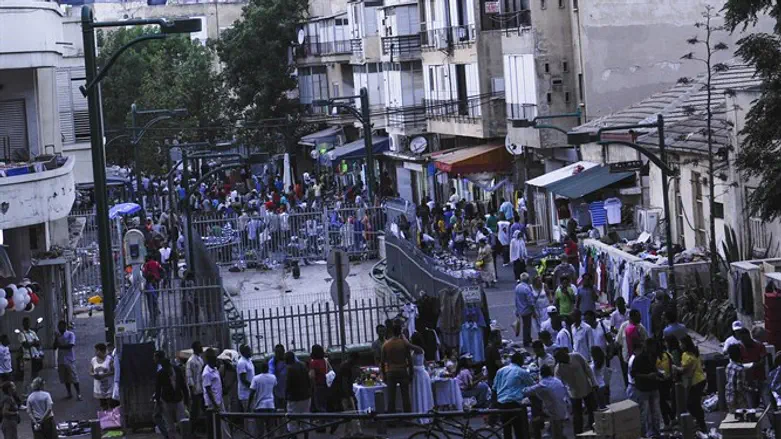
The agreement with Sudan reintroduces to the public discourse the issue of the returning infiltrators from Sudan to their homeland. Is a change in Israeli policy really expected or will the claims of danger lurking there prevail? Arutz Sheva talked about this with Center for Immigration Policy in Israel Director Yonatan Yaakobovich.
"The argument for the danger of returning most of the infiltrators from Sudan is not that they are refugees or it's dangerous to them, but that we have no ties with Sudan. They claim that they will be punished for entering Israel, which is considered an enemy state. These claims are no longer relevant," says Yaakobovich.
On claims made in the past day that returning the infiltrators will endanger their lives, and even those who have already been returned disappeared or were murdered, he says "You have to take with a grain of salt when the infiltrators say they don't want to return, and also what the aid organizations that came out in a campaign even against returning to the Philippines say; surely they'll oppose a return to Sudan. They also opposed the transfer to Rwanda, to which the EU countries also transferred people," Yaakobovich said.
In his remarks, Yaakobovich rejected claims that it was the conditions in Israel that led to returning infiltrators to Sudan where they were murdered or disappeared. He points out that the number of returnees to Sudan is over 5,000 people, so this is not an accidental drip but an influx that would not have occurred if there really was a danger to their lives. Not because of the living conditions at the Hulot facility or because 20 percent of their salary goes to waiting they will return to mortal danger. "That's a ridiculous claim," he says. "Real refugees would be begging to get to a country like Israel that took twenty percent of their salary or to be in a facility like Hulot."
Apart from the same number of over 5,000 who returned to Sudan, about 3,000-4,000 were transferred to a third country and a few hundred arrived in Western countries.
He further notes that so far a sporadic number of testimonies have been collected on the investigation of Sudanese suspected of opposing the regime, but not beyond that, he notes, based on reports from organizations whose credibility he considers to be in doubt.
In his estimation, in the near future there will be quite a few cries of opposition from the aid organizations, but it should be remembered that these are organizations that also see Rwanda and Uganda as dangerous countries, despite UN data labeling them as welcoming countries with the best asylum policies.
In his remarks, Yaakobovich notes that in the near future there will be complaints and grievances leveled at justice system, and indeed the grievances of refugees from the Darfur region will have to be heard individually, "but it should be emphasized that Western countries such as Britain, France, and others are also returning immigrants from these areas. There are top Darfurians who live in the Khartoum region of the capital of Sudan safely and peoples are part of the regime and the army. This agreement will make it possible to bring back those from these areas as well. There may be isolated individual cases of people who are indeed prominent opponents of the regime and if they can prove it they won't be able to be returned there. However, it should be remembered that the political situation there is improving dramatically and rapidly, so even those who opposed the regime until a year ago are not sure that it will be defined as it is today. It can therefore be determined with sufficient confidence that most infiltrators can return."
Regarding what is expected in the legal arena in the near future, Yaakobovich tells of what seems like a long route to the beginning of the return of the infiltrators to their country of origin: "Each of the deportees will be able to go to court and make his case, a procedure that can take years with all the appeals. Therefore, I don't expect them to board planes immediately and be returned, but if there are good answers from the State and the requests are rejected, we will see a greater exit, but the government must formulate a uniform and aggressive policy and stand by it.
"The unfortunate reality is that not only can anyone file an application but also an appeal and a request for reconsideration, later also a re-appeal, an appeal to the District Court, and then to the Supreme Court and after everything is rejected after a few years he files a humanitarian application and if it's denied then he files a medical appeal and beyond. It should be remembered that the Supreme Court ruled that female genital mutilation is a cause for emigration and therefore this claim could also arise because 70 percent of women in Sudan undergo female genital mutilation. Therefore there does not seem to be a quick solution to this issue. There will be struggle but in macro, there were 17,000 Sudanese and today there are 7,000. It will take a year or two, if the government formulates an effective and good policy of its own with good answers to the court including maybe even incentive grants that can be brought back by most Sudanese. It won't happen within a month but there is room for optimism."